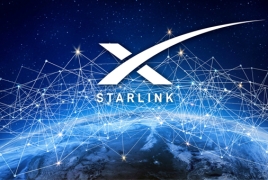
Starlink has the power to ignite a new wave of progress in Armenia, journalist and writer Craig S. Smith says in an article published in Forbes.
The closing ceremony of Armenia's World Congress on Innovation and Technology (WCIT) in October this year was charged with anticipation. Attendees expected to hear directly from SpaceX and Tesla CEO Elon Musk, a man whose exploits in space exploration and electric vehicles are matched only by his penchant for redefining digital connectivity.
But instead of Musk's face lighting up the screen, Armenian-American entrepreneur Razmig Hovaghimian took the stage, bearing Musk's words in a statement. "Hello everyone," Musk's message began, "I'm sorry I can't make it to Yerevan this time, but hopefully next time in person." He followed this with a dose of enthusiasm tailored to his audience: "Excited about bringing Starlink to Armenia and working with the local tech community on some exciting projects—from space exploration to developing open and transparent AI that pushes the boundaries of human understanding."
With these words, Musk reaffirmed his commitment to connecting Armenia to the broader world, not just in terms of internet access, but as part of a bold vision that spans space and artificial intelligence, Smith says. According to him, for a country perched at the crossroads of Europe and Asia, this was no small promise.
“The Armenian government, eager to capitalize on Musk's ambitions, has set in motion a comprehensive plan for Starlink's integration. The Ministry of High-Tech Industry has been working closely with SpaceX to navigate regulatory requirements, coordinate frequency allocations, and lay the groundwork for the infrastructure needed. This month, the Armenian Public Services Regulatory Commission approved applications by STARLINK AM LLC for an exploitation license to operate a public electronic communication network and a permit to use radio frequencies. This regulatory milestone has paved the way for the next crucial phase,” the article says.
Minister of High-Tech Industry Mkhitar Hayrapetyan announced that Starlink is now entering the testing phase, expressing optimism that this stage would be completed in the coming months, allowing the service to become fully operational. This accelerated timeline suggests that Starlink could be available to Armenian users sooner than the initially projected 2025 rollout.
The government's focus on Starlink is part of Armenia's broader digital transformation agenda, an ambitious effort to position the country as a technology-driven economy.
“While Armenia moves forward with Starlink, it's worth noting that the global landscape of satellite internet is becoming increasingly competitive. The European Union has recently signed an €10.6 billion ($11.1B) deal to build a sovereign satellite constellation called Iris² (Infrastructure for Resilience, Interconnectivity and Security by Satellite). This ambitious project aims to rival Starlink and boost the EU's digital sovereignty by providing secure communications to governments,” Smith says.
“With plans for nearly 300 satellites in low- and medium-Earth orbits by 2030, Iris² represents a significant investment in Europe's digital future and could potentially offer alternative options for countries like Armenia in the coming years.”

